Ursula K. Le Guin
Ursula K. Le Guin
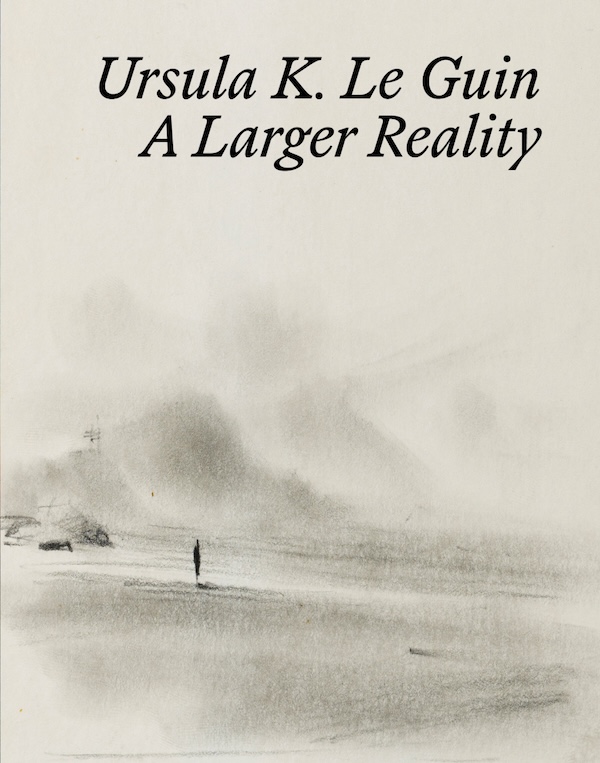
A Larger Reality
Ursula K. Le Guin, Conner Bouchard-Roberts
A beautiful compilation of poems, stories, essays, talks, and illustrations by Ursula K. Le Guin. Edited and designed by Conner Bouchard-Roberts.
With additional essays on Le Guin's thinking and craft by: adrienne maree brown, Isabelle Stengers, Moe Bowstern, Lola Milholland, Nisi Shawl, David Naimon, Mary Anne Mohanraj, Margaret Killjoy, Julie Phillips, and Harold Bloom.
This book serves as the companion publication to a gallery exhibition, of the same name, about Ursula’s life and work, showing at Oregon Contemporary Museum (from Nov 1st 2025 - Feb 8th 2026 in Portland, OR) curated by the Author’s son, Theo Downes-Le Guin.
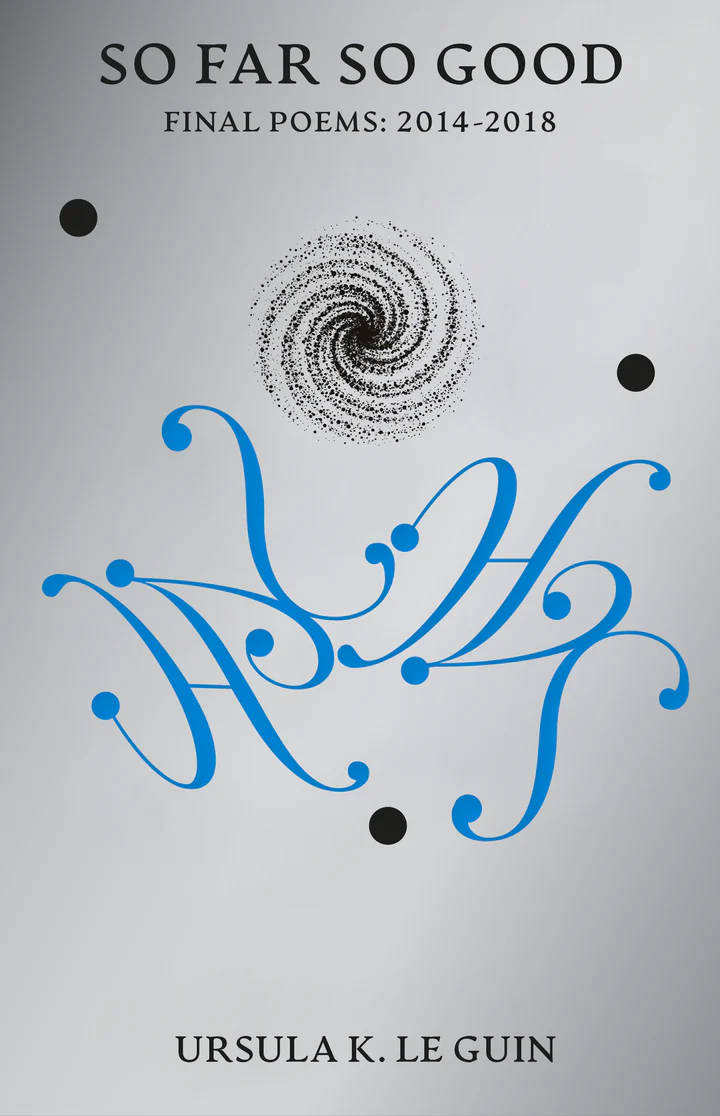
So Far So Good
Ursula K. Le Guin began writing as a poet, before writing across genres for her entire life. This elegiac collection of poems, completed shortly before her death in 2018, reflects on the soul, mortality and the mysteries beyond. Weaving together rich sounds, echoes of myth and her vivid sense of our place in the natural world, So Far So Good walks between the knowable and the unknown with characteristic daring.
“great teacher. great spirit.” adrienne maree brown

The Dispossessed
The Dispossessed is the spellbinding story of anarchist Shevek, the “galactically famous scientist,” who single-handedly attempts to reunite two planets cut off from each other by centuries of distrust.
Anarres, Shevek’s homeland, is a bleak moon settled by an anarchic utopian civilization, where there is no government, and everyone, at least nominally, is a revolutionary. It has long been isolated from other worlds, including its mother planet, Urras—defined by warring nations, great poverty, and immense wealth. Now Shevek, a brilliant physicist, is determined to unify the two civilizations. In the face of great hostility, outright threats, and the pain of separation from his family, he makes an unprecedented trip to Urras. Greater than any concern for his own wellbeing is the belief that the walls of hatred, distrust, and philosophic division between his planet and the rest of the civilized universe must be torn down. He will seek answers, question the unquestionable, and explore differences in customs and cultures, determined to tear down the walls of hatred that have kept them apart.
To visit Urras—to learn, to teach, to share—will require great sacrifice and risks, which Shevek willingly accepts. Almost immediately upon his arrival, he finds not the egotistical philistines he expected, but an intelligent, complex people who warmly welcome him. But soon the ambitious scientist and his gift is seen as a threat, and in the profound conflict that ensues, he must reexamine his beliefs even as he ignites the fires of change.

Steering The Craft
A Twenty-First-Century Guide to Sailing the Sea of Story.
With an introduction by Theo Downes-Le Guin, Karen Joy Fowler, Molly Gloss and Kelly Link.
Steering the Craft is Ursula K. Le Guin’s carrier bag of the tools of a writer’s craft: how – and why – to write. From the sound of language to tenses to point of view, Le Guin offers a comprehensive and generous guide to the fundamental components of narrative, illustrating her incisive analysis with examples from some of her favourite writers. Revised and updated for the twenty-first century, this handbook includes exercises that the writer can do alone or in a group.

Space Crone
Ursula K. Le Guin witnessed and contributed to many of the twentieth century’s rebellions and upheavals, including women’s liberation, the Civil Rights movement and US anti-war and environmental activism.
Spanning fifty years of her life and work, Space Crone brings together Le Guin’s writings on feminism and gender for the first time, offering new insights into her imaginative, multispecies feminist consciousness: from its roots in deep ecology and philosophies of non-violence to her self-education about racism and her writing on motherhood and ageing.
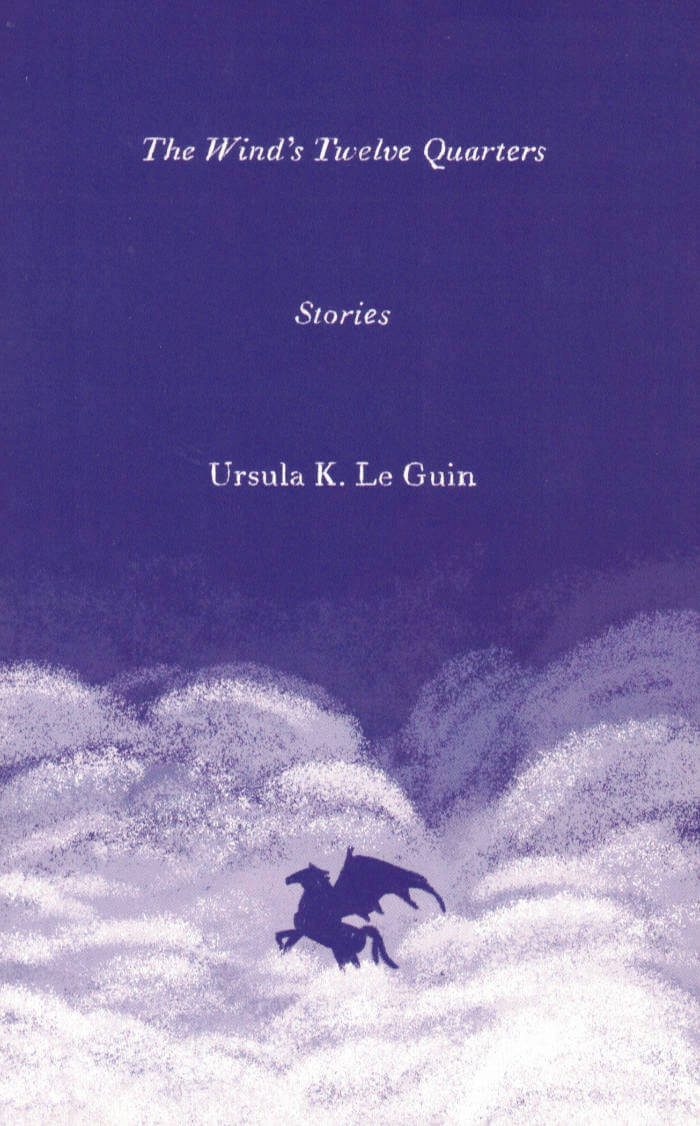
The Wind's Twelve Quarters: Stories
Seventeen short stories reveal the author's sustained concern with human relationships and values in past and future worlds of fantasy, speculation, and unearthly provision.
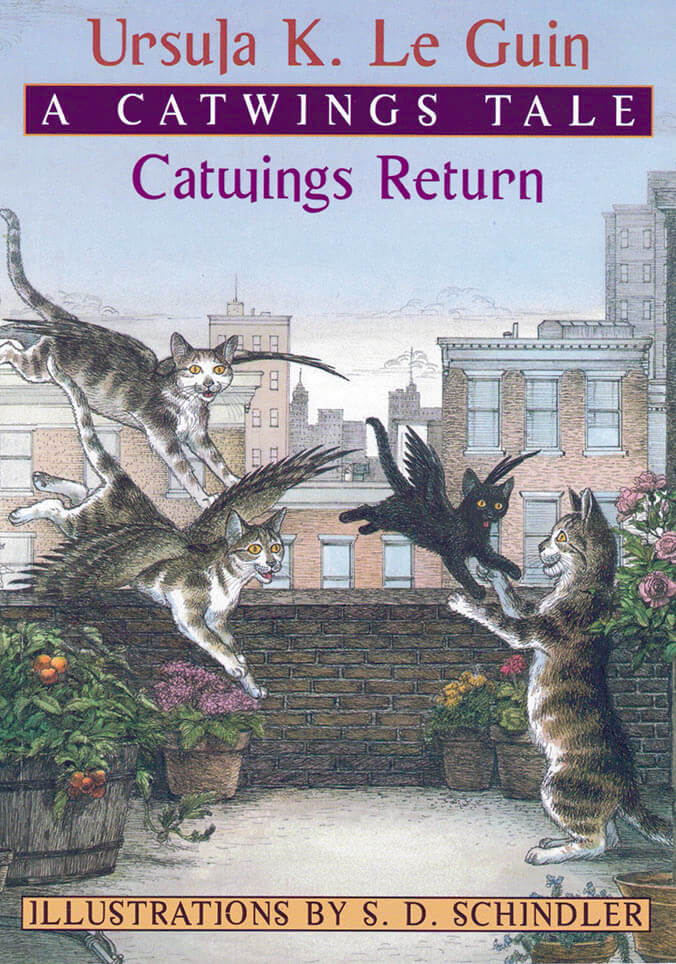
Catwings Return
A mini-edition sequel to Catwings follows four winged tabby cats as they return to the city of their birth to find their mother and a new companion.
Wishing to visit their mother, two winged cats leave their new country home to return to the city, where they discover a winged kitten in a building about to be demolished.

Wonderful Alexander and the Catwings: A Catwings Tale
When a spoiled kitten named Wonderful Alexander gets caught in a tree, it's up to Jane to save him. Once he is rescued and adopted by the catwings, Alexander decides to repay Jane's favor by helping her to overcome her mysterious fear of speaking.
Ursula Le Guin writes both poetry and prose, and in various modes including children's books, YA books, fantasy, science fiction and fiction.
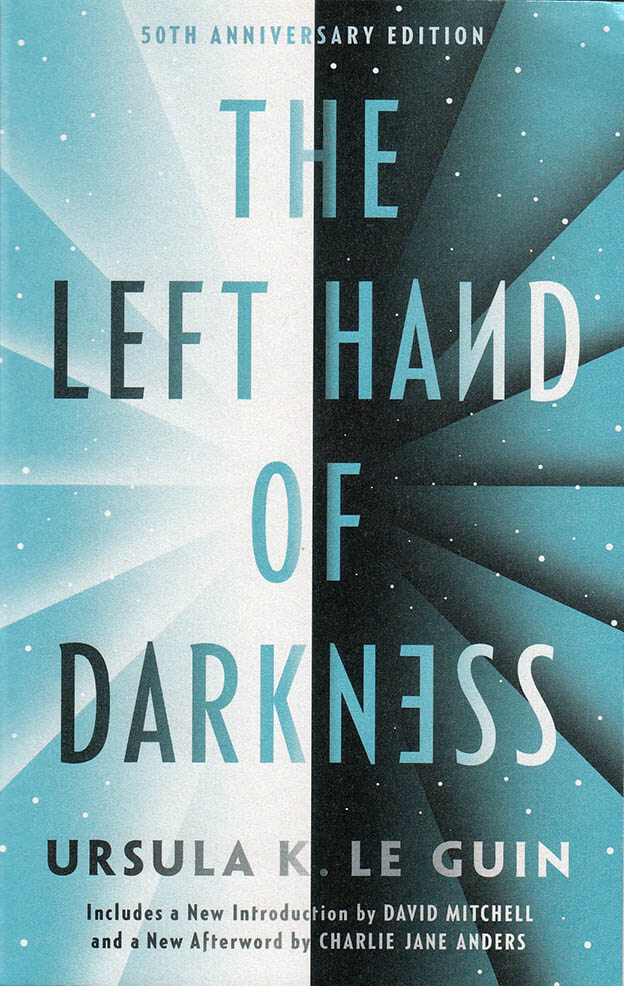
The Left Hand of Darkness
The Left Hand of Darkness tells the story of a lone human emissary's mission to Winter, an unknown alien world whose inhabitants can choose, and change, their gender. His goal is to facilitate Winter's inclusion in a growing intergalactic civilization. But to do so he must bridge the gulf between his own views and those of the completely dissimilar culture that he encounters. Exploring questions of psychology, society, and human emotion in an alien world, The Left Hand of Darkness stands as a landmark achievement in the annals of science fiction.

The Carrier Bag Theory of Fiction
In The Carrier Bag Theory of Fiction, visionary author Ursula K. Le Guin tells the story of human origin by redefining technology as a cultural carrier bag rather than a weapon of domination.
Hacking the linear, progressive mode of the Techno-Heroic, the Carrier Bag Theory of human evolution proposes: ‘before the tool that forces energy outward, we made the tool that brings energy home.’ Prior to the preeminence of sticks, swords and the Hero’s killing tools, our ancestors’ greatest invention was the container: the basket of wild oats, the medicine bundle, the net made of your own hair, the home, the shrine, the place that contains whatever is sacred. The recipient, the holder, the story. The bag of stars.
This influential essay opens a portal to terra ignota, where the possibilities of human experience and knowledge can be discovered anew.
And more
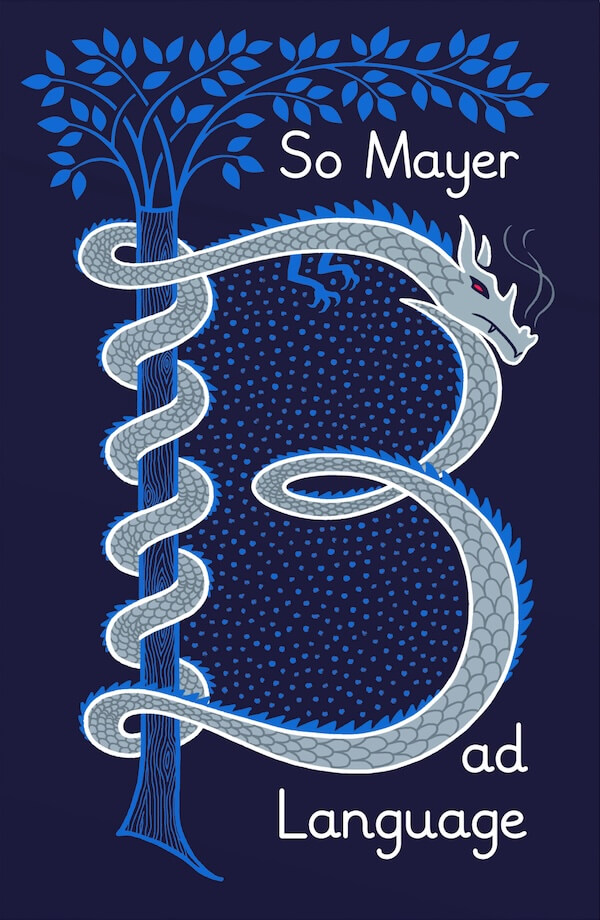
Bad Language
There is no such thing as a safe word.
In Bad Language, So Mayer blends memoir and manifesto as they explore the politics of speech, while looking at how language has been used – and abused – in their own life. What is the relationship between language and sexual violence? And how can we ‘make ourselves up’ in language when words themselves are encoded by a dominant culture that insists we see ourselves as powerless listeners rather than active speakers?
Examining the semantic traps of their multi-lingual childhood – and taking in texts from the Torah to Grimms’ Fairytales, from protest bust cards to the works of Ursula K. Le Guin – Mayer asks who gets to speak, and who is forced into silence. Bad Language calls out the harm that words can do, while searching for crafty ways through which we can collectively reclaim language for protest and pleasure.
‘Mayer’s writing is generous, astute and sincere; in Bad Language, they choose their words carefully, using incantation and spell to distil a complex argument – the transformative power of language lay in its ability to shape sense perception. For Mayer, the task of ‘making ourselves up’ is another way of asking, what kind of world do we want to live in?’ – Lola Olufemi
SO MAYER is a writer, editor, bookseller and organiser. Truth & Dare, their first collection of speculative fiction, was longlisted for the Republic of Consciousness and Edge Hill Short Story prizes. With Sarah Shin, they co-edited Ursula K. Le Guin, Space Crone, winner of the 2024 Locus Award for non-fiction. Bad Language is their second book for Peninsula, after A Nazi Word for a Nazi Thing.
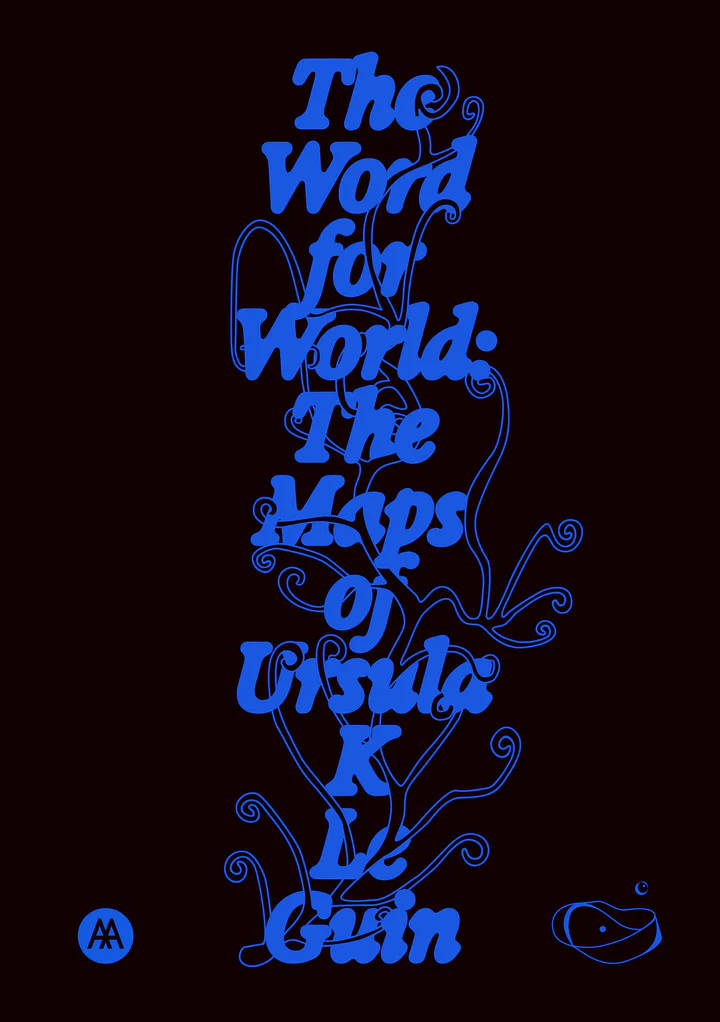
The Word for World: The Maps of Ursula K. Le Guin
When Ursula K. Le Guin started writing a new story, she would begin by drawing a map. The Word for World presents a selection of these images by the celebrated author, many of which have never been published before, to consider how her imaginary worlds enable us to re-envision our own.
Le Guin’s maps offer journeys of consciousness beyond conventional cartography, from the Rorschach-like archipelagos of Earthsea to the talismanic maps of Always Coming Home. Rather than remaining within known terrain, they open up paradigms of knowledge, exemplified by the map’s edges and how a map is read, made and re-made, together. The Word for World brings her maps together with poems, stories, interviews, recipes and essays by contributors from a variety of perspectives to enquire into the relationship between worlds and how they are represented and imagined.
Contributors: Federico Campagna, Theo Downes-Le Guin, Daniel Heath Justice, Bhanu Kapil, Canisia Lubrin, Una McCormack, David Naimon, Nisha Ramayya, Shoshone Collective, Standard Deviation, Marilyn Strathern.
Co-published by Spiral House and AA Publications to coincide with an exhibition of Ursula K. Le Guin’s maps at the Architectural Association, London, opening on 10 October 2025.
”One of the literary greats of the 20th century.” Margaret Atwood

After Sex
Who decides what happens after sex? The last decade has seen many significant changes to the laws governing women’s reproductive rights around the world, from liberalisation in Ireland to new restrictions in the USA. After Sex offers personal and political perspectives from the mid-20th century to the present day, setting feminist classics alongside contemporary accounts. These essays, short stories and poems trace the debates and tell the stories; together, they ask us to consider what reproductive justice might look like, and how it could reshape sex.
The writers pay special attention to people — both fictional and real — who have sought control over their sexual lives, and the joy, comedy, difficulties and disappointments that entails. But above all, After Sex testifies to the power of great writing to show us why that freedom is worth pursuing — without shame and without apology.
With contributions from:
Lauren Berlant, Joanna Biggs, Edna Bonhomme, Gwendolyn Brooks, Beverley Bryan, Stella Dadzie and Suzanne Scafe, Storm Cecile, Lucille Clifton, Rachel Connolly, T.L. Cowan, ’Jane Does’, Maggie Doherty, Nell Dunn, Andrea Dworkin, Anne Enright, Deborah Friedell, Tracy Fuad, Kristen Ghodsee, Vivian Gornick, Donna Haraway, bell hooks, Barbara Johnson, Jayne Kavanagh, Lisa Hallgarten and Angela Poulter, Jamaica Kincaid, Patricia Knight, R.O. Kwon, Ursula K. Le Guin, Natasha Lennard, Sophie Lewis, Audre Lorde, Amelia Loulli, Erin Maglaque, Holly Pester, Adrienne Rich, Denise Riley, Sally Rooney, Loretta J. Ross, Madeleine Schwartz, SisterSong, Sophie Smith, Annabel Sowemimo, Amia Srinivasan, Keeanga-Yamahtta Taylor, Judith Jarvis Thomson, Alice Walker and Bernard Williams.

Basic Mechanics
Isabelle Weber, Maud Gyssels and 1 more
Basic Mechanics is a hold-loose collection of words as findlings and carriers, that hold or lose meaning. Consequently, a description of this work will never simply come out of one’s mouth. The narrative will seem tied together with loose threads. As Ursula K. Le Guin writes in The Carrier Bag Theory of Fiction, we know the story of the hero with the spear and the violence and the teleological progression. But isn’t the story that can be told by all, one of carrying and being carried? Isn’t language a wrapping for all those contradictory and wondrous thoughts and feelings? And can they be captured on paper, for a while, and set free again to counterbalance the killer story?
Confessing secrets and desires to each other became a method of sharing. Accompanied by giggles, we somatically connected the stories we carry, which we (dare to) place with another, which move from the inside out. This publication spills, soaks, opens and closes to confessions, poems and drawings in looping motifs. A shell swimming in a sea of words.

BRICKS FROM THE KILN #5
Andrew Walsh‐Lister, Matthew Stuart
Bricks from the Kiln is a semi-yearly journal and multifarious publishing platform established in mid-2015 to support critically minded and explorative writing on and around art, design and literature. Edited by Matthew Stuart and Andrew Walsh-Lister, the forthcoming issue, number five, begins with a single sentence:
blankets topologies in glistening snow and blood — produces instructional spattering, again and again — coughs up clotted network diagram hairballs of illegibility — parasitically draws on / from Thomas Browne’s quincunx — meets for The Big ROAR tomorrow, yesterday — lifts loud cows off the page, aloud — flips the coin of language, heads or tails? — politely speaks on writing heard yet seen — twists tongues, transliterates and teases — makes contact with ancestral spirits — traverses the foothills of La Marquesa, past and present — is the Spectre at the feast — (re)traces polymorphous concrete poems — dashes, gestures, speaks, breathes, moves, joyness — is, as ever, tentative, incomplete and inconsistent.
Contributions by Helen Marten, Rebecca May Johnson, Johanna Drucker, Louis Lüthi, Daisy Lafarge, Holly Pester, Ursula K. Le Guin, Quinn Latimer, Stefan Themerson, Slavs and Tatars, Ashanti Harris, Catalina Barroso-Luque, Kevin Lotery, Bronac Ferran with Greg Thomas and Astrid Seme with Alex Balgiu.

Fiction: The Function
'Fiction' is an ongoing series of works that place themselves between performance props, functional accessories and sculptural objects - an attempt to fuse multiple ready-mades into a cluster that successfully intergrades all three at once.
Fiction: The Function, was the first physical display of these objects, of these handbags, these vessels: meant to carry stories and secrets, as well as depositories of junk from everyday life. They reference the feminist theory of Ursula K. Le Guin, The Carrier Bag of Fiction which opposes the dominant theories claiming the first man-made invention to be the penetrating sword or spear and argues for the alternative that carrier bags are more likely to have been the earliest human tool.
As proper ”carriers of fiction” themselves the sculptures exhibited were accompanied by a publication including scans of found and collected objects combined with original poems.
Designed by Atelier Brenda

The Material Kinship Reader
Kris Dittel, Clementine Edwards
What does it mean to acknowledge one’s closeness to, enmeshment in or even kinship with the material world? And what does it mean to question family structures – the way they organise, coerce and make deviant certain lifeforms – and dwell in other possibilities of kin-making?
Not just a jolly rethinking of objects or a polyamorous romp through relationships, The Material Kinship Reader reckons with the extractavist histories of materials and the social relations that frame much of contemporary life.
Spanning fiction and theory, the collection of texts expand the idea of an artist’s book by bringing words into conversation with an aesthetic proposition. Clementine Edwards’ artwork is the visual weft to the book’s written net. From colonial conquest to climate collapse, The Material Kinship Reader tells toxic and tender stories of interdependence among all things sentient and insentient.
Including contributions by Sara Ahmed, Hana Pera Aoake, Roland Barthes, Joannie Baumgärtner, Heather Davis, Kris Dittel, Clementine Edwards, Ama Josephine B. Johnstone, Robin Wall Kimmerer, Ursula K. Le Guin, Sophie Lewis, Steven Millhauser, Jena Myung, Aileen Moreton-Robinson, Michelle Murphy, Ada M. Patterson, Kim TallBear and Michelle Tea
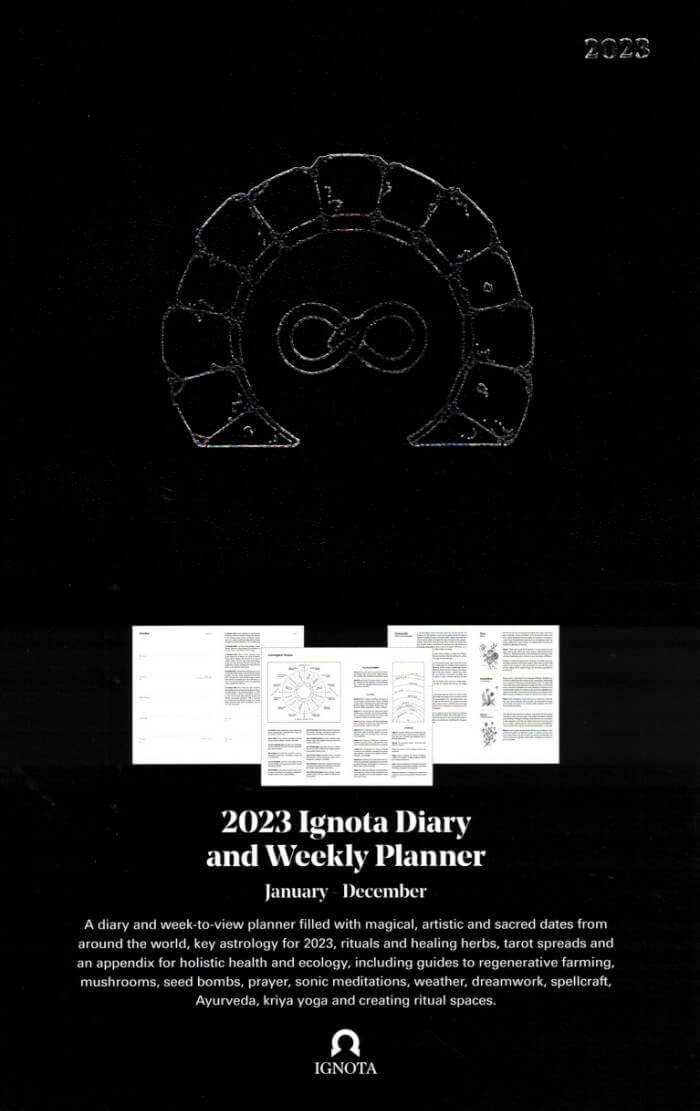
Ignota Diary 2023
This beautifully designed diary and week-to-view planner is filled with historically significant magical and sacred dates from around the world. Drawn from events such as the Buddha’s birthday, esoteric festivals and artistic and occult history, the diary touches on the lives of characters such as Ursula K. Le Guin, Ithell Colquhoun, Zora Neale Hurston, Carl Jung, Simone Weil, Leonora Carrington, Maya Deren, Aleister Crowley, George Bataille, Timothy Leary, Hilma af Klint, Saint Hildegard of Bingen, William Blake, W.B. Yeats and Octavia Butler.
Contributors:
Acupressure by Maria Christofi, Astrology by SJ Anderson, Ayurveda and Prajna by Mira Manek, Dreamwork by Jennifer Dumpert, Herbal Remedies by Paige Emery, Kriya Yoga by Rachel Okimo, Korean Ink Illustrations by Jungran Kim, Mushroom Guide by Ellen Percival, Prayer Guide by K Allado-McDowell, Regenerative Farming by Elias Haase, Rituals by Pam Grossman and Himali Singh Soin, Ritual Spaces by Leila Sadeghee Seed Bombs by Jenna Sutela, Soji by Shoukei Matsumoto, Sonic Meditation by Pauline Oliveros, Spellcraft by Bones Tan-Jones, Tarot by CAConrad and T. Susan Chang, Weather by Jay Drinkall

Ignota Diary 2022
The Ignota Diary is a tool for discovery in the practice of everyday life.
The Ignota Diary is a tool for discovery in the practice of everyday life. This beautifully designed diary and week-to-view planner is filled with historically significant magical and sacred dates from around the world. Drawn from events such as the Buddha’s birthday, esoteric festivals and artistic and occult history, the diary touches on the lives of characters such as Ursula K. Le Guin, Ithell Colquhoun, Zora Neale Hurston, Carl Jung, Simone Weil, Leonora Carrington, Maya Deren, Aleister Crowley, George Bataille, Timothy Leary, Hilma af Klint, Saint Hildegard of Bingen, William Blake, W.B. Yeats and Octavia Butler.
The diary provides full astrological navigation for 2022 with an overview of the year, a birthchart template and guides to moon magic, houses, planets and symbols. Key transits, retrogrades and lunar phases, noted throughout the planner, allow you to organise your life in alignment with the astrological weather, visible at a glance. A global map showing sacred sites provides inspiration for transformative pilgrimages.

The Mill
The Mill is the second of three projects to engage the resource industries of Vancouver Island (mining, forestry, and fisheries) through contemporary art and writing. This publication responds to forestry: a mobile industry of logging camps that follow the trees; prices that rise and fall; mills that open and close; communities that boom and bust. In The Mill, artworks are accompanied by a multiplicity of voices, including forestry workers, plant ecologists, and indigenous land stewards. Together, these perspectives chart the cultural and material shifts brought about when trees become commodities.
The Mill is a project that emerged on Vancouver Island to follow a thematic path from the microcosms of the forest floor to the quantifying and processing of lumber and the global distribution of forestry products. Expanded from two exhibitions at the Nanaimo Art Gallery, “Silva Part I: O Horizon” and “Silva Part II: Booming Grounds,” this book examines forgotten or under-acknowledged histories, while considering both local sites and forms of cultural expression that surround international forestry practices.
Contributions by Celestine Aleck, E. Richard Atleo (Umeek), Marian Penner Bancroft, Myrtle Bergren, Al Bersch & Leslie Grant, Peter Culley, Wilmer Gold, Bus Griffiths, Robert Guest, Jason de Haan & Miruna Dragan, Richard Hebda, Robin Wall Kimmerer, Ursula K. Le Guin, Duane Linklater, Liz Magor, George Sawchuk, Carol Sawyer, W. G. Sebald, Kathy Slade, Kate Stefiuk, Kika Thorne, Nancy Turner, Fred Wah, Elias Wakan, Merv Wilkinson, Anne Pask-Wilkinson, Ashes Withyman.
Graphic design: Will Holder.

The New Atlantis
Three short novels by some of science fiction's greatest writers - Ursula K. Le Guin, James Tiptree, Jr., and Gene Wolfe, edited by Robert Silverberg.
The New Atlantis, by Ursula K. Le Guin: In a dark near-future, global warming and a ruined ecology is causing the continents to sink into the oceans just as the towers of Atlantis re-emerge above the sea. Locus award winner and Hugo finalist.
Silhouette, by Gene Wolfe, and A Momentary Taste of Being, by James Tiptree, Jr., present two different masterpieces on a similar theme: A deep-space colony exploration ship approaches their target planet, where they must investigate whether or not it's hospitable enough to signal Earth to send more colonists. Things are not as they seem... Nebula / Locus award finalist stories.
Three of science fiction's most gifted writers-winners of Hugos, Nebulas, and a National Book Award-unleash their imaginations to present startling glimpses of humanity's future on Earth and in space. Blended into that future are age-old mysteries of the human psyche, mythicized fragments of the past, and the eternal question of biological purpose.
In "Silhouette" Gene Wolfe creates a self-contained world, an immense starship on a multi-generational mission to assure continuation of the race by colonizing the stars. It is a world, devised and constructed through man's technical genius, that comes to be threatened by the primitive superstitions and petty jealousies carried into space by the very technicians who serve in science's most ambitious project. The salvation of the mission and of the hundreds of lives bound to it comes to depend on a curious interplay of technology and occult human abilities.
Ursula Le Guin remains earthbound, but on a "brave, new world" where a bureaucratic tyranny proves less and less able to cope with supplying the needs of a burgeoning population. A subtle irony pervades her story, "The New Atlantis." Even as government strives to assure permanence of control, geologic upheavals awaken a haunting racial memory of antediluvian civilizations and grandeur long buried beneath the seas.
James Tiptree, Jr., confronts a disciplined space crew with humanity's first encounter with a wholly alien life form. Here again the survival of the human race depends on successful location of a new planet where mankind can establish its society with renewed vigor. But out of the questions of how to survive any threat that may be posed by an unknown life form arises a more central question: Is it intended that humanity survive?
Published August 2020

Where Are the Tiny Revolts?
Anthony Huberman, Jeanne Gerrity
Where are the tiny revolts? is the first book in a new annual series published by CCA Wattis Institute, a contemporary art center and research institute in San Francisco. Each book in the series is driven by a central question: what are we learning from artists today? Unconnected to an exhibition program, Where are the tiny revolts? is rooted in the Wattis's artist-driven research institute. It is a place to explore and share some of the texts and visual work that emerge over the course of an entire year of discussions and public programs. Instead of providing documentation of projects with artists, Where are the tiny revolts? offers other ideas, voices, and references generated by conversations with and about artists.
The first book in the series, informed by themes related to the work of Dodie Bellamy, revolves around questions related to contemporary forms of feminism and sexualities, the rebirth of the author, and ways in which vulnerability, perversion, vulgarity, and self-exposure can be forms of empowerment. The texts cover a broad array of styles, including memoir, theoretical essay, art historical analysis, poetry, and fiction. The visual elements are equally diverse, ranging from photographs to collage to drawing.
Texts by Sara Ahmed, Nicole Archer, Georges Bataille, Dodie Bellamy, Michele Carlson, Thomas Clerc, Combahee River Collective, Bob Flanagan, Ursula K. Le Guin, Johanna Hedva, Glen Helfand, Juliana Huxtable, Alex Kitnick, Julia Kristeva, Audre Lorde, Lisa Robertson; contributions by Marcela Pardo Ariza, Justin G. Binek, Kaucyila Brooke, Tammy Rae Carland, Mary Beth Edelson, Mike Kuchar, Anne McGuire, Patrick Staff, Frances Stark, Rosemarie Trockel.
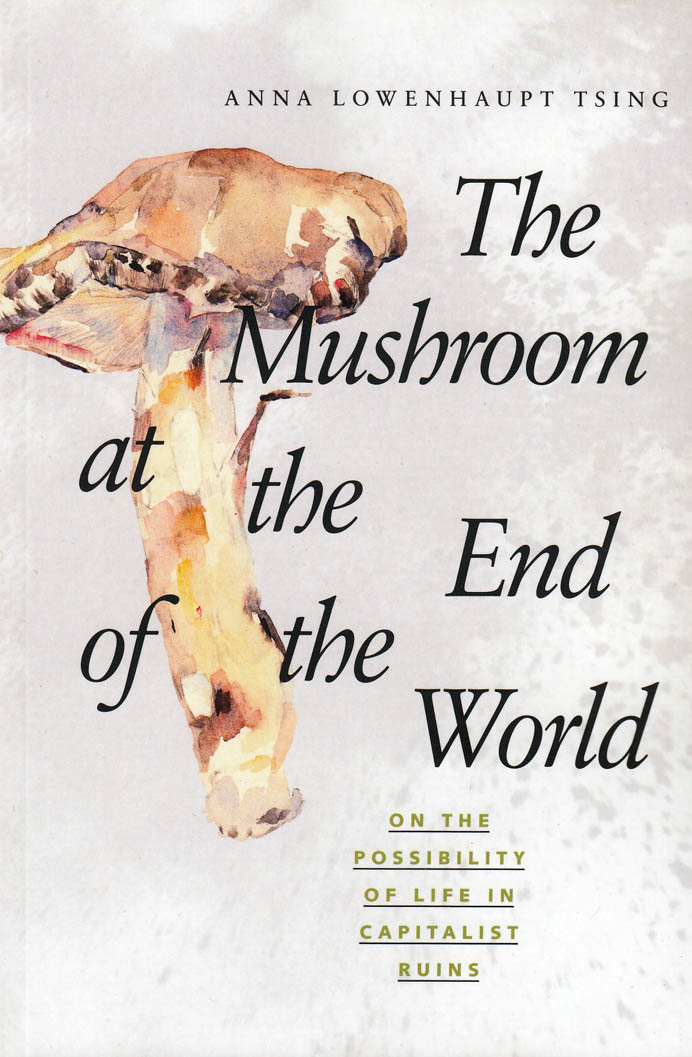
The Mushroom at the End of the World
What a rare mushroom can teach us about sustaining life on a fragile planet. Matsutake is the most valuable mushroom in the world,vand a weed that grows in human-disturbed forests across the northern hemisphere. Through its ability to nurture trees, matsutake helps forests to grow in daunting places. It is also an edible delicacy in Japan, where it sometimes commands astronomical prices. In all its contradictions, matsutake offers insights into areas far beyond just mushrooms and addresses a crucial question: what manages to live in the ruins we have made?
A tale of diversity within our damaged landscapes, The Mushroom at the End of the World follows one of the strangest commodity chains of our times to explore the unexpected corners of capitalism. Here, we witness the varied and peculiar worlds of matsutake commerce: the worlds of Japanese gourmets, capitalist traders, Hmong jungle fighters, industrial forests, Yi Chinese goat herders, Finnish nature guides, and more. These companions also lead us into fungal ecologies and forest histories to better understand the promise of cohabitation in a time of massive human destruction.
By investigating one of the world's most sought-after fungi, The Mushroom at the End of the World presents an original examination into the relation between capitalist destruction and collaborative survival within multispecies landscapes, the prerequisite for continuing life on earth.
"Scientists and artists know that the way to handle an immense topic is often through close attention to a small aspect of it, revealing the whole through the part. In the shape of a finch's beak we can see all of evolution. So through close, indeed loving, attention to a certain fascinating mushroom, the matsutake, Anna Lowenhaupt Tsing discusses how the whole immense crisis of ecology came about and why it continues. Critical of simplistic reductionism, she offers clear analysis, and in place of panicked reaction considers possibilities of rational, humane, resourceful behavior. In a situation where urgency and enormity can overwhelm the mind, she gives us a real way to think about it. I'm very grateful to have this book as a guide through the coming years." - Ursula K. Le Guin
